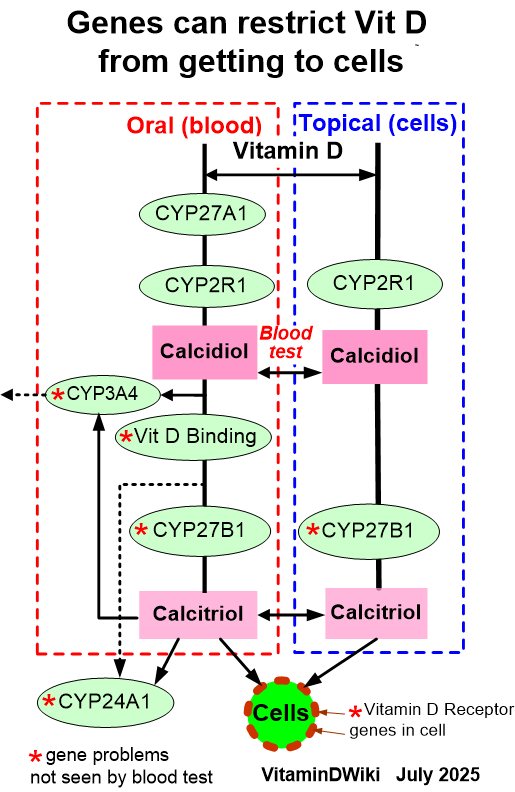Increased Phosphorus increases Vitamin D getting to cells (CYP24A1, pigs)
Tissue-Wide Expression of Genes Related to Vitamin D Metabolism and FGF23 Signaling following Variable Phosphorus Intake in Pigs
Metabolites. 2022 Aug 6;12(8):729, doi: 10.3390/metabo12080729.
Maruf Hasan 1 , Michael Oster 1 , Henry Reyer 1 , Siriluck Ponsuksili 1 , Eduard Murani 1 , Petra Wolf 2 , Dagmar-Christiane Fischer 3 , Klaus Wimmers 1 2

Calcium (Ca) and phosphorus (P) homeostasis is maintained by several regulators, including vitamin D and fibroblast growth factor 23 (FGF23), and their tissue-specific activation and signaling cascades. In this study, the tissue-wide expression of key genes linked to vitamin D metabolism (CYP2R1, CYP27A1, CYP27B1, CYP24A1, GC, VDR) and FGF23 signaling (FGF23, FGFR1-4, KL) were investigated in pigs fed conventional (trial 1) and divergent P diets (trial 2). The tissue set comprised kidney, liver, bone, lung, aorta, and gastrointestinal tract sections. Expression patterns revealed that non-renal tissues and cells (NRTC) express genes to form active vitamin D [1,25(OH)2D3] according to site-specific requirements. A low P diet resulted in higher serum calcitriol and increased CYP24A1 expression in the small intestine, indicating local suppression of vitamin D signaling. A high P diet prompted increased mRNA abundances of CYP27B1 for local vitamin D synthesis, specifically in bone. For FGF23 signaling, analyses revealed ubiquitous expression of FGFR1-4, whereas KL was expressed in a tissue-specific manner. Dietary P supply did not affect skeletal FGF23; however, FGFR4 and KL showed increased expression in bone at high P supply, suggesting regulation to balance mineralization. Specific NRTC responses influence vitamin D metabolism and P homeostasis, which should be considered for a thrifty but healthy P supply.
📄 Download the PDF from VitaminDWiki
VitaminDWiki pages with Phosphorus in title
This list is automatically updated
{LIST()}
VitaminDWiki - CYP24A1 in title (31 as of Aug 2022)
CYP24A1 gene and Vitamin D - many studies

Most people do too much Phosphorus, but some have too little
- "Some health conditions, such as diabetes, starvation, and alcoholism can cause levels of phosphorus in the body to fall. The same is true of conditions that make it hard for people to absorb nutrients, such as Crohn disease and celiac disease."
